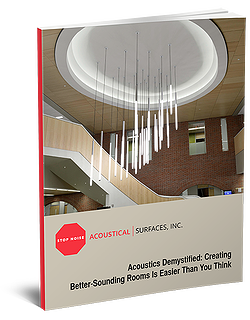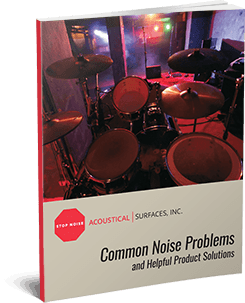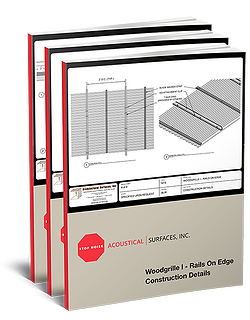How to Soundproof a Counseling Office
Counseling can be a godsend. Having someone who allows us to vent, reflect, and examine our lives has changed the lives of millions of people. When we see counselors, we have certain expectations of privacy. If we walk into a counseling office and hear other people’s sessions through the waiting room walls, we may think twice about scheduling that next appointment. Provide your patients with the privacy they expect and deserve by shoring up shoddy construction materials with professional soundproofing and acoustic materials.
The Importance of Soundproofing Your Counseling Office
When we go to any place expressly for the purpose of feeling comfortable and letting go, we expect a welcoming and secure environment. If the counseling office we visit doesn’t make a concerted effort to make that happen, we may feel they aren’t as invested in our mental health as we are.
When we talk in small interior spaces, the sound waves we create can bounce off the hard surfaces in the room and actually become louder through echo and reverberation. When sound waves reflect, they pass back across the room and mix with the new sound waves created by your continued speech. This can lead to voices carrying into spaces they don’t belong. You can take care of this problem in your own counseling office with soundproofing materials.
How to Soundproof a Counseling Office
When people first start to throw around the idea of soundproofing therapist offices, it can feel like a daunting task. Don’t worry. It’s not as tough as you’d think, and you can actually do a lot of it yourself, meaning you won’t be spending big money on labor. Let’s look at the office soundproofing methods you can complete yourself.
Get a Denser Door
The doorway is often the main culprit when it comes to sound passage between rooms. Basic interior doors aren’t very dense and allow for a lot of sound passage. Upgrading to a more solid soundproof interior door increases the mass and reduces a good amount of the noise that passes through the door.
Utilize a Door Seal Kit
Even the densest door can’t block the sound that passes around it. Many doors have gaps between them and the frames around them. If you don’t seal those gaps, sound can pass through easily. Acoustic door seals contain everything you need to close up the gaps around your doors the second you close them.
Don’t Forget the Door Sweep
In order to cover the larger gap at the bottom of the door, we use door sweeps. A door sweep will likely be included in a quality door seal kit, but not all kits include them. Standard door sweeps help a bit, but since they have to be mounted high enough to provide clearance over the hardwoods or carpet, they don’t fully seal the space.
Upgrade to an Automatic Door Sweep
An automatic door sweep solves this problem by engaging and sliding down to the floor when the door hits the frame and disengaging when you open it. That means you have enough clearance to smoothly open and close the door but still create a tight seal when the door is closed.
Get Better Windows
Windows don’t always create privacy issues, but outside noises can make their way through old windows and become a distraction. This could cause patients to speak more loudly, increasing the chance their voices carry into adjacent rooms. A new set of double or triple glazed windows will create real separation between your counseling office and the outside world.
If the cost of new windows is something you’d rather not undertake right now, you can get great results by fitting your old windows with window inserts. Installing window inserts gives you an additional pane of glass and adds a gap between panes that pulls big weight in the soundproofing world. You can get them in standard and custom sizes, so they’ll fit snugly and reduce any gaps around the perimeter of nearly any window.
Add Mass to the Walls
If the building contractor didn’t take the fact that you’d be operating a counseling office out of the space, they may not have used thick enough materials in the walls to keep each room sonically separated. You’ll need to add some mass if you want to prevent sound passage between rooms. Here’s how to soundproof office walls.
Insulate the Walls
If opening up the walls is an option, or you are building your counseling office from the ground up, adding insulation between interior rooms is a great noise abatement solution. Most interior walls are not constructed with insulation in them since it’s not usually necessary to keep heat or AC in one particular room. Developers and contractors focus on exterior walls when installing insulation.
Add a Second Layer of Drywall
Another option that’s especially helpful if you don’t want to open up any walls is to add a second layer of drywall on top of your existing drywall layer. By doubling up on the drywall, you quickly and easily add mass to the wall. Thicker drywall will block more sound, but make sure your walls are capable of handling the additional weight.
Use Green Glue
If you want to take your added drywall to the next level, add some green glue between the layers. Green glue is formulated to dissipate all frequencies of sound waves and prevents the majority of them from passing through the wall. It’s easy to apply and delivers incredible results.
Roll on Some Mass Loaded Vinyl
Another option that is great when you don’t want to open up the walls is to roll out a layer of mass loaded vinyl (MLV) on top of your drywall. As its name suggests, MLV is loaded with mass, so it gives your walls the ability to absorb more sound waves without transferring vibrations into the wall.
If you are planning on adding that second layer of drywall, a layer of mass loaded vinyl between the sheets is another way to take their performance to the next level. No matter where you roll it out, it’s a simple DIY sound barrier for office spaces that can be completed by anyone with basic tools and a little gumption.
How to Acoustically Treat a Counseling Office
Soundproofing won’t immediately solve all your issues. Even though they’ve been soundproofed, the doors, walls, and windows will still reflect sound waves around the room due to their reflective surfaces. A good number of wall decorations are also reflective.
In order to keep the reflections down and create a more serene environment, you’ll have to add softer, more porous materials into your decor.
Add Acoustical Treatments
Counseling office decor is actually the perfect complement to your soundproofing and acoustical treatment plan. Furnishing a room with plants, bookcases, and soft, absorbent furniture pull a lot of weight in sound control. These types of objects absorb and scatter sound waves, meaning they can help with reducing echo and reverberation.
Fabric Wrapped Acoustical Panels
One of the best pieces of decor you can use in your counseling office to absorb sound waves is fabric wrapped acoustical panels. These pieces of sound deadening material for office spaces look great and trap more sound than any other piece of decor you’ve probably got. They can also be hung anywhere on the wall, so you can place them directly in the line of speech to break up the largest reflective surfaces in the room.
Hang Acoustical Curtains
A fantastic complement to your window treatment plan is the addition of acoustical curtains. Acoustical curtains are heavyweight noise reduction curtains that not only block out light almost completely, but they are dense enough to absorb sound waves too. Whether those waves are created inside the room or are sneaking in through the windows from outside, these sheets of sound absorbing material for office spaces will keep them under control.
Put Down an Area Rug
If you’ve got hardwoods or tile in your counseling office, those reflective floors can kick up audio waves and exacerbate sound issues. Wall to wall carpeting is helpful, but if you’ve got beautiful floors, why cover them completely? Adding area rugs to the rooms will incorporate soft, absorptive materials into your floors without damaging your hardwoods.
Introduce White Noise
If the room is too quiet, it promotes an uncomfortable sensory experience. A great counseling office has to have some ambient noise in order to feel warm and cozy. Investing in a white noise machine can give every space in the office a comfortable feel that allows people to feel good about digging deep and verbalizing the things they are going through.
Introducing white noise to each room also masks some of what you say from both sides of the wall, so conversations and revelations remain between counselor and client. Go for a whole office setup to create a uniformly pleasant sound throughout the office.
Use Professional Materials and Enlist Help
Soundproofing an office space isn’t terribly difficult, but you’ve got to know what you’re doing. You’ve also got to use quality materials if you want a great result. Consulting with pros on your counseling office soundproofing project will ensure you use the right materials for the job and don’t waste time and money on materials that you don’t need or that won’t deliver the results you’re after.
Acoustical Surfaces offers the materials and know-how to make each counseling room in your office a sanctuary for reflection. Whether you’re learning how to make a home office soundproof, or need a solution on a much bigger scale, reach out to see how we can help.



